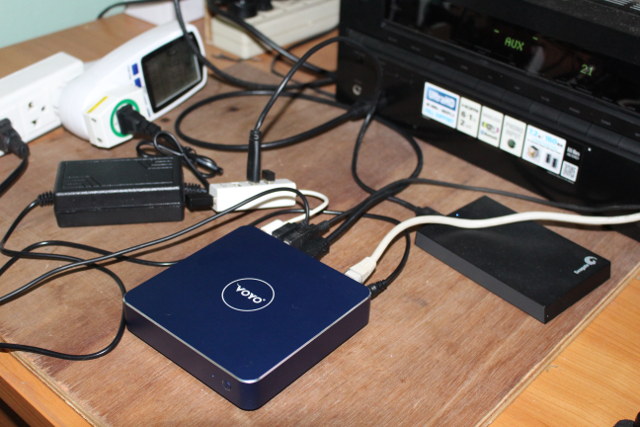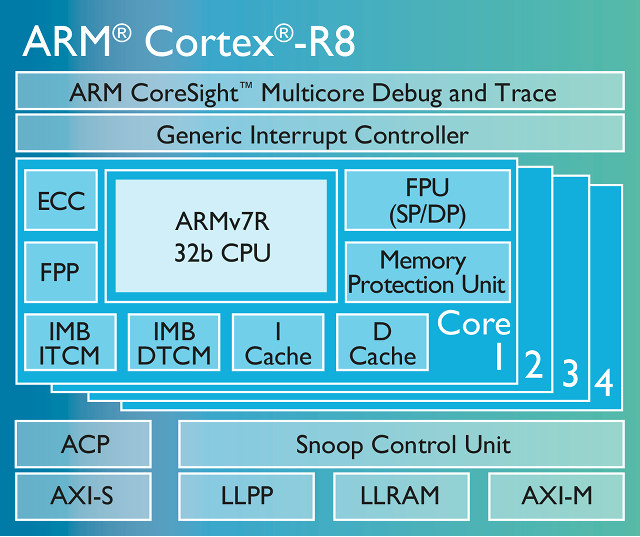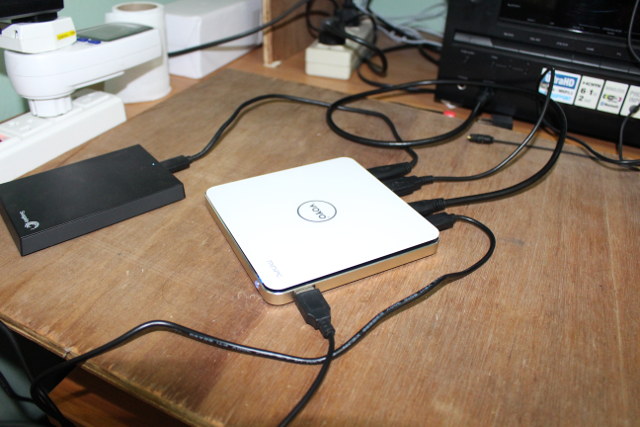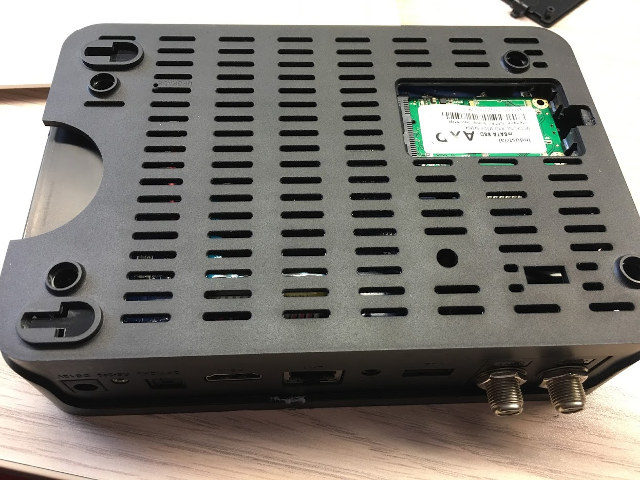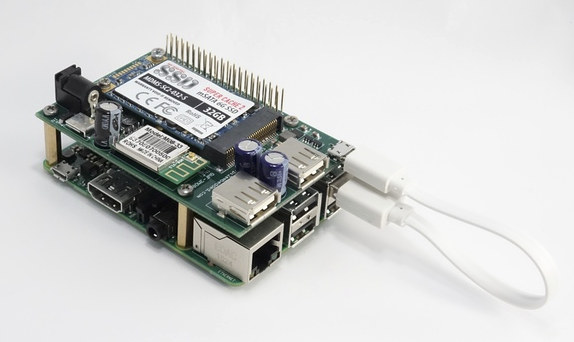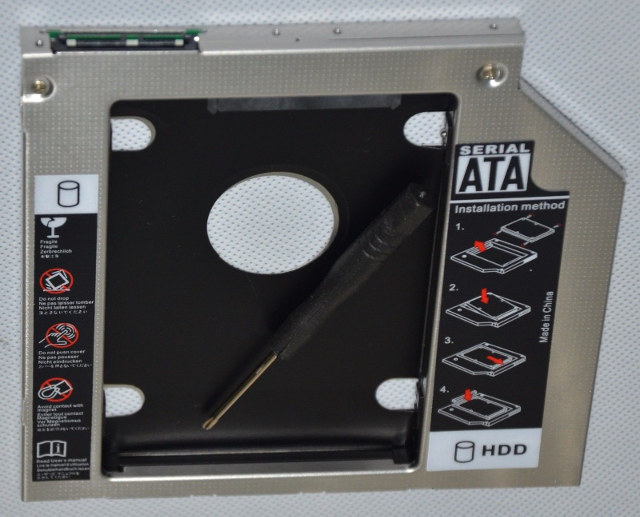Voyo VMac Mini, also sometimes referred to just Voyo V1, is an actively cooled mini PC powered by Intel Celeron N3450 or Pentium N4200 Apollo Lake processor. I’ve received samples for both, and already taken pictures of the device and motherboard. So in the second part I’ll review the mini PC checking out system info, running some benchmarks on both, and see how it performs as an entry-level desktop PC. Voyo VMac Mini Setup and System Information Setup is pretty straightforward, as you just need to connect mouse and keyboard, Ethernet, the mini HDMI to HDMI cable, optionally the included USB WiFi dongle, the power supply, and finally press the power button to get to Windows 10 desktop logged in as “admin” user in about 30 seconds. Some Apollo Lake mini PCs support HDMI 2.0 video output, but this requires a DisplayPort to HDMI 2.0 bridge chip, which not included […]
Fasetto LINK 256GB to 2TB SSD Portable WiFi NAS is Powered by Samsung Exynos 7420 Processor
Fasetto LINK is a wireless portable storage for your smartphone, camera, or other device, includes 256GB, 512GB, or 2TB SSD storage, and – for some reasons – is based on a rather powerful Samsung Exynos 7420 octa-core processor coupled with 4GB RAM. The device can also take expansion blocks to add extra battery or/and LTE connectivity via pogo pins. LINK specifications: SoC – Samsung Exynos 7420 octa core big.LITTLE processor with 4x Cortex A57 core @ 2.1GHz + 4x Cortex A53 cores @ 1.5Ghz, and Mali-T760 MP8 GPU System Memory – 4GB LPDDR4 Storage – 256GB, 512GB, or 2TB Samsung NVMe SSD Connectivity – 802.11ac WiFi + Bluetooth 4.0, optical LTE via expansion block Expansion – 17-pin ball connector USB – USB type C port Battery – 1,300 mAh battery (2 weeks standby; 5 hours streaming); optional 1120mAh expansion block (total: 4 weeks standby; 8 hours streaming) Dimensions – 5.08 x […]
Vorke V1 Braswell mini PC Unboxing and Teardown
Vorke V1 is a Braswell mini PC pre-loaded with Windows 10, powered by an Intel Celeron J3160 quad core with 4GB RAM, 64 GB internal storage, and two important features if you want to use it as a desktop PC: support for internal 2.5″ hard drive, and dual display support via HDMI and VGA ports. GeekBuying sent me a sample for review, and I’ll do a two part review, starting with pictures of the device, and its internal, before publishing the second part testing the performance, stability and features of the mini PC. Vorke V1 Unboxing There’s not much to say about the package, as it’s just a bland carton box with a sticker with Vorke V1 name, processor and memory info. The mini PC ships with a 19V/2.1A power supply and a power cord, as well as a mounting bracket and 5 screws for 2.5″ SATA SSD or HDD. […]
ARM Cortex-R8 Real-Time Processor targets SSDs, LTE Advanced and 5G Modems, and Other Embedded Applications
ARM Cortex-A processor may get all the media buzz as they are found in popular consumer devices such as smartphones, but ARM also provides Cortex-R processors with real-time capabilities that are found in cars, hard drives, and other embedded systems requiring high reliability, fault tolerance, and deterministic real-time responses. The company has just announced Cortex-R8 real-time core that should double the performance of Cortex-R7 core, and targeting mainly storage devices such as SSDs and HDDs, as well as next generation LTE and 5G modems. Cortex-R8 key features: Microarchitecture – 11-stage pipeline with instruction pre-fetch, branch prediction, superscalar and out of order execution, register renaming, parallel execution paths for load-store, MAC, shift-ALU, divide and floating-point. Also features a hardware divider and is software compatible with the ARM9, ARM11, Cortex-R4, Cortex-R5 and Cortex-R7 embedded processors. Instruction Set – ARMv7-R architecture with Thumb-2 and Thumb. Support for DSP extensions, as well as an […]
Voyo V3 Intel Atom x7-Z8700 mini PC Review with Windows 10
Voyo V3 is one of the first Cherry Trail mini PCs based on Intel Atom x7-Z8700 quad processor that promises both higher CPU and GPU performance, and more I/O connectivity compared to Intel Atom x5 platforms. I’ve already posted pictures of the device and its guts in the first part of the review, so today in part 2 of the review, I’ll focus on testing how the device perform with its pre-installed operating system: Windows 10 Home. Setup and System Information There’s no much to say about setup for this device, since all you have to do is to connect the cable, and press the button to access Windows 10 desktop. There are however two interesting aspect of the boot process: As you connect the power supply, you’ll see the power button blue LED lit, but it does not mean it has started. I could see the power consumption was […]
WeTek Play+ Amlogic S905 Android Set-Top Box Features a Tuner with a SmartCard Reader and an mSATA SSD Bay
When WeTek announced the WeTek Core, some people were disappointed that they did not include a tuner like in the original WeTek Play, but the company has been working on a successor called Wetek Play+ that is based on Amlogic S905-H quad core processor and supports DVB-S/S2, DVB-C/T/T2, ISDB-T and ATSC tuners with a smartcard reader, as well as an extra store with an half-size SSD slot. WeTek Play+ specifications: SoC – Amlogic S905-H (Revision C) quad core ARM Cortex-A53 @ up to 2.0GHz with penta-core Mali-450MP GPU @ 750 MHz System Memory – 2 GB DDR3 Storage – 16 GB eMMC 5.0 flash + micro SD card slot + mSATA SSD socket (implemented via USB to SATA) Video Output – HDMI 2.0 up to 4K @ 60Hz with HDCP 2.2 support, and AV port Audio – HDMI, AV (stereo), optical S/PDIF Tuners – Support for DVB-S2, DVB-C/T/T2, ISDB-T and […]
Add an SSD, WiFi, and RTC to Your Raspberry Pi 2 Board with a $49 CSB502SSD Add-on Board (Crowdfunding)
If you wish your Raspberry Pi 2 could be a little more responsive, including WiFi connectivity and keep the time even when network is not available, and a few extra goodies then Pi 2 Design‘s CSB502SSD add-ons board (Raspberry Pi HAT) could be worth a look. CSB502SSD technical specifications: Storage – mSATA socket for up to 1TB on-board storage via PL2571 USB to SATA bridge controller USB – 2x extra USB 2.0 ports Connectivity – GWF-3M08 WiFi 802.11 b/g/n module (Ralink RT5370) with IPEX connector and up to 150 Mbps connection. Real Time Clock – DS1339 with 16mm coin cell battery backup and programmable alarm. Sensors – 1-Wire DS18B20 temperature sensor to monitor the health of SSD drive. 64-bit ID to identify the shield Power Supply – 8V-24V DC input (Up to 27.5W) for peripherals and Raspberry Pi 2. Dimensions – Full size Raspberry Pi 2 I/O Shield Since the […]
Add an SSD to Your Laptop with a $5 Optical Drive Caddy Adapter
Performance of computers are often limited by their hard drive performance, and if you’ve ever upgraded from a mechanical hard drive to a SSD, you’ll be fully aware of the massive boost achieved by that upgrade. Many laptops come with a hard drive and a DVD drive, and if you’re not using the DVD drive that much or at all, you could purchase an ultra cheap optical drive caddy adapter to install an SSD into your laptop, or just another 2.5″ hard drive if you need extra storage. You’ll need to insert the SSD into the caddy, and replace the CD/DVD drive by the caddy. I’ve been informed of this trick via a link on eBay taht’s for an optical caddy adapter specifically for Lenovo IdeaPad Z50-70 B50-30, but if you search for “hdd optical caddy” you’ll find several “universal” optical caddy adapter for HDD and SSD with 12.7mm or […]


